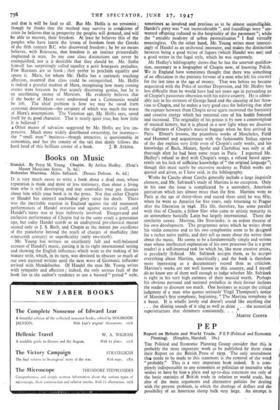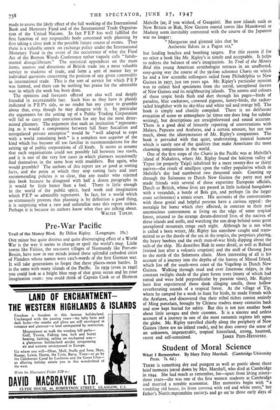PEP
THE Political and Economic Planning Group consider that this is probably the most important work to be published by them since their Report on the British Press of 1939. 'The only amendment that needs to be made to this statement is the removal of the word "probably." This is a very important book indeed. It is com- pletely indispensable to any economist or politician or journalist who wishes to have by him-a plain and up-to-date statement not only of the basic statistics of British trade in relation to world trade, but also of the main arguments and alternative policies for dealing with the present problem, in which the shortage of dollars and the possibility of an American slump bulk very large. An attempt is
made to assess the likely effect of the full working of the International Bank and Monetary Fund and of the International Trade Organisa- tion of the United Nations. In fact P E P has well fulfilled the first function of any responsible body concerned with planning by first taking a close look at the possible future course of events. Thus there is a valuable annex on exchange policy under the International Monetary Fund in the event of the occurrence of what the Final Act of the Bretton Woods Conference rather vaguely calls "funda- mental disequilibrium." The statistical appendices on the main items, sources and directions of British trade are a most valuable service to students of trade, and form a sort of master key to individual questions concerning the position of any given commodity in international trade. .This is the sort of service for which P E P was formed, and there can be nothing but praise for the admirable way in which the work has been done.
The opinions and forecasts offered are also well and deeply founded in ascertainable fact. Such bias as they have is plainly indicated in P E P's title, so no reader has any cause to grumble about that, even though he may disagree with it. In particular the arguments for the setting up of a Public Trading Corporation will fail to carry complete conviction for any but the most deter- mined planners. The argument that such an institution "represent- ing as it would a compromise between full State Socialism and unregulated private enterprise" would be "well adapted to cope with a world containing both" is a complete non sequitur of the kind which has become all too familiar in recommendations for the setting up of public corporations of all kinds. It seems to assume that such organisations could not possibly fall between two stools, and it is one of the very few cases in which planners occasionally find themselves in the same boat with muddlers. But again, who would grumble? The authors of this report are so good at sorting facts, and the point at which they stop sorting facts and start recommending policies is so clear, that any reader who rejected this book because he disagreed with half a dozen paragraphs in it would be little better than a fool. There is little enough in the world of the public spirit, hard. work and imagination which P E P so admirably represents. In fact, for a world which so strenuously protests that planning is by definition a good thing, it is surprising what a rare and unfamiliar note this report strikes. Perhaps it is because its authors know what they are talking about.
WALTER TAPLIN.



































 Previous page
Previous page